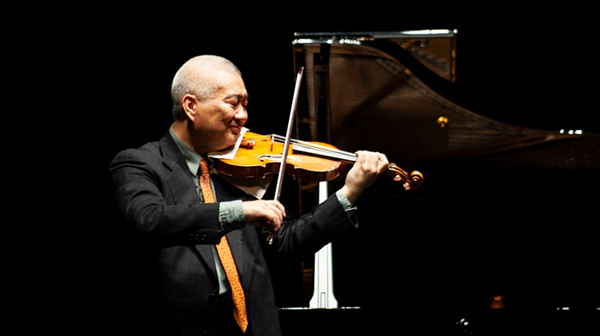Striking a chord


Chin Kim performs during his China tour in Wuxi, Jiangsu province, May 29. [Photo by Xiao Da/China Daily]
The theater lamplights dim, leaving only a spotlight on center stage. The whispering crowd quickly quietens as the audience trains its eyes on the artist, as music lovers prick up their ears and hold their collective breath.
Gently and deftly, Chin Kim begins to play his violin, an instrument he's known for more than 55 years. Mellifluous melody pours from the vibrating strings, from major to minor keys, with several deceptive cadences thrown in between, followed by a bravura flourish and series of extraordinary trills that celebrate the 15-minute sonata's electric theme.
"It's the Violin Sonata in G minor, or the Devil's Trill, by Giuseppe Tartini," Kim told China Daily during a rehearsal in Wuxi, in Jiangsu province on Wednesday night. He stretched out two fingers, imitating a tiptoeing demon that reputedly appeared to the composer at his bedside, inspiring the composition.
The Korean-born American classical violinist, who has been actively concertizing throughout North America, Asia and Europe for over three decades, is in the middle of his debut China tour. He will travel to 18 cities across the mainland in the span of a month.
"I love giving concerts. And I want to spread classical music as much as possible to the world. So when the China tour was suggested, I said yes."
Kim managed to squeeze some time from his hectic schedule to sample the oriental culture and cuisine which is rooted in the street.
"[China has] beautiful towns and nice people. I was told to be careful with the street food. But I have to try it," he said. "The Chongqing hotpot is so good."
Kim's way to repay the courtesy he has found in China is to deliver magnificent recitals, performing some of the most dazzling works in his repertoire including pieces by Tartini, Johann Sebastian Bach and Jascha Heifetz.
At the age of 62, Kim thinks his musicality and virtuosity is still on the rise, as he gains a deeper understanding of those master works on a daily basis.
"Every time you pick up the same piece you have played, you have to look at it like you have never seen it before, so that it is new," he said.
"So for every concert I try something new. It might be a fingering, phrasing, tempo change, etc. And I keep experimenting with different things to see if I can find a better way to do something."
The Wuxi stop of his tour turned out to be major success, so much because Kim enchanted the audience of some 500 with his marvelous mastery of the instrument in a two-hour feast for the ears.
"It's quite worth it. He's got such an expressive tone. He gave us a fantastic solo tonight," said Du Jiehua, a 40-something accountant and music lover.
As much as Kim is satisfied with his personal achievement, he frets about the shrinking fanbase for classical music in North America these days. The teacher at Mannes College of Music New York attributes the predicament to the general decline in educational and cultural awareness and values.
"Classical music is in danger of shrinking," he said.
"In America, younger children's exposure to classical music is not enough. In Paris if you walk down a street you'll hear Mozart. But you don't get that in New York, maybe only in some fancy café. "
Compared with the US market, the relatively nascent Chinese market is showing every sign of being robust, especially when it comes to teaching music. At least 40 million Chinese children play the piano alone, according to Gramophone, the influential London-based music magazine in March, concluding that China holds the key to the future of classical music.
That sentiment is echoed by Chinese musical cognoscenti.
"More and more families let their children study classical music," said Cui Jianbin, director of operations at Wuxi Grand Theater.
"And an increasing number of world-class symphony orchestras and musicians come to China every year, which will make it the largest market for classical music," Cui added.
That delightfully evident phenomenon has not been lost on Kim.
"In the US most of the audience has grey hair; here is China I've seen a lot of children, which is a very good sign," he said.
"Many people think you have to know something about classical music to appreciate it and that's false information. You don’t have to know anything about it. Just come and feel it."
MOST POPULAR
Editors' Picks
 Infographic:
Milestones in China's high-speed railway development
Infographic:
Milestones in China's high-speed railway development
 Infographic:
China's NEV industry performance review
Infographic:
China's NEV industry performance review
 Infographic:
China's low-altitude economy: A transformative force
Infographic:
China's low-altitude economy: A transformative force




